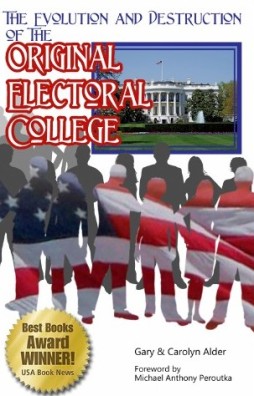Letter to an Atheist at a Senior Center
Dear Ms. S______,
You indicated that you are subjected to hearing “grace” before meals said aloud at the senior center where I presume that you reside. You indicate that you want to change that practice and wonder if there is any law to do so. I must inform you that there would be no way to pass such a law constitutionally.
Let me explain in detail, for I infer from the tone of your concern that you think there should be. I hope you will pardon the length that the response will take but I believe that if you understand the source and the depth of the rights that we enjoy as citizens of this great nation, you will understand why we must go to such great lengths to protect these rights.
When our nation was only a collection of British Colonies there was a point where we determined that our rights as Englishmen were being abused by the British Crown beyond what could be further tolerated. It was therefore decided that by right we should be a separate nation. The Declaration of Independence was therefore drafted declaring the principles upon which this nation was to be established. Thomas Jefferson was the individual primarily responsible for the wording of the Declaration.
The concepts and even the words of the Declaration of Independence show over and over again Mr. Jefferson’s wisdom and love of freedom. He was not alone in this love for freedom. In fact freedom, in a word, is the foundation upon which our nation was built. I love freedom and I believe that you love freedom as much as I do. Let us work together to preserve this, the greatest, of all attributes of this land. But first, let us look for the source of this concept called freedom.
In the first paragraph of the Declaration of Independence, “the Laws of Nature and of Nature’s God” are used to state the authority by which we are entitled to exist as a separate nation with equal status to all other nations. The next paragraph states that “all men are created equal,” and “that they are endowed by their Creator with certain unalienable Rights,” listing “Life, Liberty, and the pursuit of Happiness” as the prime examples.
This clearly shows that we each have as much right to exist and to pursue happiness as does any other individual upon this planet. “Governments” (implying all governments) are instituted “to secure these rights” and showing the source of all governmental authority for “just powers” as coming “from the consent of the governed.” While this does not prove that God exists, it does show without question that the founders believed that it was their God-given opportunity and indeed obligation to create a new nation established according to true and eternal principles. It also demonstrates that government is an institution made by man and therefore is answerable to man to the exercise of the powers granted to it. In brief government did not create man, man created government and it is supposed to remain man’s servant.
Now I realize as you do that the Declaration of Independence is not the same as the US Constitution; so why am I taking so much time to discuss these issues in light of and in terms of the Declaration? The reason is that the Declaration in a way promised much more than just to show that King George was trampling on the basic rights of the Colonists; it promised to create a government that was built around freedom and the rights of the individual instead of the tyrannical oppressions of any individual or group of individuals who happened to be in power.
The drafting and ratification of the US Constitution is the fulfilling of this promise. In many respects the Declaration is in fact the true preamble to the Constitution.
When the patriots and statesmen who established our form of government contemplated how to go about it, they observed that our lives consist of three realms, political, economic, and religious. Lest any confusion arise on this point let me define the political realm as the way that people deal with each other in a society: the economic realm as how people obtain the physical necessities to keep them alive; and the religious realm as the beliefs concerning man’s origin and destiny, and how to achieve that destiny.
The founders had seen how governments whether it be those that they had lived under, or others that they studied, acted with regard to these three realms. They realized the necessity of having enforceable laws to control the political realm. They also saw that the result of government exercising control in either the economic realm or in the religious realm resulted in tyranny and oppression.
By the same token it was obvious that power exercised by religious leaders using coercive means either of their own or by collusion with government, which by definition has coercive powers, also resulted in tyranny and oppression. Experience had shown that in every effort to escape religious persecution, each society that tried to establish a new state sponsored religious practice ended up practicing their own brand of oppression.
The framers of the Constitution wanted freedom to reign and designed the document with that in mind. Any delegation of powers to the federal government was limited to that which was explicitly mentioned. As you read the constitution you notice very little mentioned concerning the religious or the economic realms of our lives. That was on purpose. The fact that there was no power granted to the government in these realms was to be understood to state that government is to stay out of these realms.
The First Amendment was added to the Constitution to state explicitly that government coercion must stay out of the religious realm. The provisions of the Constitution as well as the Bill of Rights are intended to leave the people free to pursue their own interests and take responsibility for their own acts. In other words the Constitution was created to control government and to allow us as individuals to practice freedom.
So my advice to you is to practice freedom and let others practice freedom. That is what this country is all about. I do not believe that the pronouncement of “grace” at your place of residence is done to offend you. If you are offended, you are the only one that can control your feelings. Since you do not believe in God, someone who prays probably looks similar to a person who talks to himself.
It would seem that either situation would fall under the constitutional freedom of speech right of the individual. It would seem to me that you would be free to either be offended or not to be offended. That is the beautiful thing about freedom. It empowers you the individual.
There are several other aspects of your freedom that I would invite you to exercise. First you are free to talk to the management of the B_______ Senior Center and express your concerns. They however are also free to accept or reject your case. If you really don’t want to hear prayer, you might want to exercise your freedom by coming to meals after “grace” has been said. Another option might be to eat in your room and then socialize afterward with your friends.
I would suggest that if none of these options is to your liking, you have the freedom to search for another place of residence where the situation more closely fits your desires. That is the great opportunity that this country provides all of us. On the other hand if we try to get the government to restrict the freedoms of others, we will find our own freedoms will disappear also.
Sincerely,
________________


